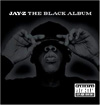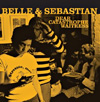
Comment
on this story
|
 |

This Week: Jay-Z and B&S at their best, a Talking Heads anthology, the Accident Experiment's dark sonic passages, and Rachel's musical expansion
Jay-Z

The Black Album (Roc-a-fella)
Jay-Z, aka Jigga, aka HOVA (short for Jehova, self-esteem not a problem here), aka S-dot (as in S. Carter, his custom Reebok line, the first awarded to a non-athlete), ne Shawn Carter, is on the cusp of 33 and (he says) he's retiring. This, his ninth album in seven years, is his last word, his victory lap, his curtain call, fini.
Nobody believes that, of course, least of all him—by track four, he's already planning to "come back like Jordan," a parallel that's exaggerated, but not wildly so. He is, by any reasonable reckoning, one of the great MCs of the past decade, with an unerring ear for bullets over Broadway (this is the guy who sampled Annie). His business skills are nearly as impressive. Jay likes to brag (over and over, in just about every song) that he learned his capitalism moving cocaine on the streets of Brooklyn. He and his partner Damon Dash built the aptly named Roc-a-fella into a multizillion-dollar enterprise with a roster of affiliated acts, a movie production company and a hugely popular clothing line.
Jay had already put a dent in 2003 as the crucial voice on two of the year's great singles (his girlfriend Beyonce's summer-stealing "Crazy in Love" and Panjabi MC's cross-continental anti-war bhangra-rap "Beware of the Boys"). But on his putative last testament, he dispenses with the platoons of guest MCs and enlists nothing but top-shelf talent behind the boards (the production roster is a hip-hop who's-who: Timbaland, the Neptunes, Eminem, Rick Rubin, Just Blaze). The result is an album of relentless hooks and '70s soul-funk horns that flags slightly toward the end before driving home with a shamelessly virtuosic double-time waltz.
Along the way, Jay invokes all his old Rat Pack gangsta-isms, but with a difference — he wants you to know he's a hip-hop veteran, a CEO, a grown man ("I don't wear jerseys, man, I'm thirty-plus/ Give me some crisp jeans, nigga, button-ups"). He's still up for a beef (see the joyously murderous "Threat"), but he also brings along his mom and forgives his dead junkie dad, and at the end of it all, he's ready to join the B-boy bourgeoisie. On his way out the door, he says, "I'm going golfing/ Fuck it, I might even get a cappuccino."
Fuck it, why not? This is a pro at the top of his game—self-assurance verging on ennui, but enough competitive spirit left for one more go-round.
—Jesse Fox Mayshark
Belle & Sebastian

Dear Catastrophe Waitress (Rough Trade)
An intelligent pop album of love, sadness, joy and hope always gets to me because as much as an album is needed in this world it's so rare that one ever appears. Well thankfully here comes another and low-and-behold wouldn't you know, it's another Belle and Sebastian album. It seems like every few years my stereo whines it's way through a plethora of imbecilic rock and electronic bands to get to a relief from the monotony with a B&S album. This is a new sound for B&S, one that covers a variety of 60's and 70's AM radio sounds. Rather than an imitation, it just seems to grow organically from everything they've done in the past.
The band grows up in both sound and subject matter—their first and second albums having a lot to do with the problems of high school and college. Now on their sixth full-length, the album is full of references to the business world, getting out on your own, hanging out with other jaded pals as well as a clearer base of spirituality. For instance the song "If You Find Yourself Caught In Love" demands one to "say a prayer to the man above/Thank Him for everything you know/You should thank Him for every breath you blow." In "You Don't Send Me," about an ex who begrudgingly avoids the singer, Murdoch sings, "Our little scene is getting smaller by the day/It's a human zoo/But the key is change, getting over all your problems/You're not a fool." A lesson we all should learn, but rarely do.
—Travis Gray
Talking Heads

Once in a Lifetime (Rhino/Warner)
Housed in this user-unfriendly package, with vintage Joy-of-Sex-like artwork, Once in a Lifetime is just about everything anyone would need to hear by this feted foursome, and more besides. Three discs tell the Heads story in remastered detail, generously sampling each of their eight studio records. (There's also a DVD included for those who like their listening images provided.) From the disarming simplicity of Talking Heads '77 through the suave, multikulti shades of Naked, one can trace an increased sense of accomplishment coming to bear on David Byrne's skewed pop writing and his bandmates' clever augmentation of same. One of the tenets of so-called art rock is that the artist be distanced from the subject matter—casting it in tampered relief—but Byrne wasn't being ironic when he sang about civil servants, artists' prerogatives, or boy vs. girl politics. His songs were direct, if not always with a point, which is where the whole "stop making sense" tagline came in handy. The band had limited range, but range nonetheless: compare the early grooving of "Stay Hungry" with the boxed-in paranoia of "Memories Can't Wait;" dig the later essays in gospel fervor ("Puzzlin' Evidence") and Latin rhythms ("Mr. Jones"). Chief among the Heads' merits is that they never bothered to repeat themselves, not even when a couple of radio hits may have offered the temptation.
The band's three-album association with producer Brian Eno was significant, although the booklet essays only mention his name in passing. By the time of Remain in Light (1980), he was a fifth creative member, pushing Byrne even further away from conventional pop writing. Over funky loops and writhing instrumental fabrics came some of Byrne's most liberated creations, namely "Once in a Lifetime" itself and the album's spiritual centerpiece, "The Great Curve" (unfortunately MIA here). Apres Eno, the band went back to basics (Little Creatures, True Stories), with some refined studio know-how and all fawning critical ears upon them.
Overall, this is a valuable collection—10 years, 55 songs, a better example of what New York's new wave had wrought. My favorites: "I Zimbra," "Found a Job," "Memories Can't Wait." Other listeners will have no trouble locating their own.
—Chris Mitchell
The Accident Experiment

Arena (Independent)
Earlier this year, guitarist Marcos Curiel went through an ugly public breakup with his former band P.O.D. Depending on whose side of the story you believe, Curiel either left to pursue a side project or was kicked out of the band due to differing spiritual and philosophical viewpoints.
The Accident Experiment is that new band, a side project no longer. Together with Pete Stewart, another fallen son of the Christian music industry, Curiel has crafted a band that is both lyrically honest and musically adventurous.
Those looking for a sequel to P.O.D.'s mingling of rap, reggae and rock won't find it. The Accident Experiment sounds more like a Disturbed or Chevelle with bits of Pink Floyd, Rush and Led Zeppelin baked into the crust.
In other words, what you're getting is only passably radio friendly modern rock. Instead, The Accident Experiment would rather lead listeners down dark, twisting sonic passages. Abrupt rhythm changes, moody guitars, and Stewart's gooey, wailing vocals guide listeners across hesitant emotional footholds, where little is certain.
Equally intriguing is Stewart's lyrical power. Stewart has long been prone to bleak, sometimes angry word power. He's no different here. From his disappointment with spirituality ("Broke my bones so I could find you/ Cut myself to be around you/ And when I bled you disappeared") to P.O.D's supposed hypocrisy ("Tellin' people what they want to hear/ All your pretty bullshit in their ears"), Stewart addresses and challenges perceptions of dreams, insanity, and depression.
The Accident Experiment is already making large waves in San Diego, where it won Best New Band in the San Diego Music Awards, and is one of the only independent bands garnering airplay on mainstream radio. Here's hoping the rest of the country catches on quickly.
—Lloyd Babbit
Rachel's

Systems/Layers (Quarter Stick Records)
Referring to Rachel's as post-rock would probably be unfair, because the group doesn't really come from rock roots as such. "Post-postrock" might be an applicable tag, despite its redundancy. But hey, tags are for losers.
And this loser prefers to tag Rachel's as futuristic ensemble music. Rachel's employs an interesting and wildly varied aggregation of "traditional" instruments and found sounds in a non-traditional context to create music that is truly experimental and, well, just darn good.
Truthfully, the music of Systems/Layers is best considered in the context of contemporary classical music. The group bears comparison to the Bang on A Can All-Stars or even the Kronos Quartet, if only for the instrumentation. And one can't ignore Rachel's employment of modern technology either.
There is some kind of highfalutin explanation for the process in which Systems/Layers was created, and this explanation is surely of merit to academic types. But the bottom line is that this is nothing more than a interesting disc. And what could be more meritorious?
Presuming to interpret exactly what is being communicated through this dark, opaque and brooding sound would be ridiculous. Furthermore, anyone's particular interpretation would only serve to trivialize a body of work whose strength lies in its indefinable qualities. The album's sonic vignettes can be used as ambient sonic wallpaper, or as a focal point for deep meditation. And either approach is as valid as the other.
This is one of those discs that will become a milestone of musical expansion, even though it probably won't shift too many units at present. And besides, nothing becomes "classic" overnight. Fans of John Cage, Steve Reich,
Glen Branca, Rhys Chatham, Sigur Rós and especially Gavin Bryars take note.
—John Sewell

December 4, 2003 * Vol. 13, No. 49
© 2003 Metro Pulse
|